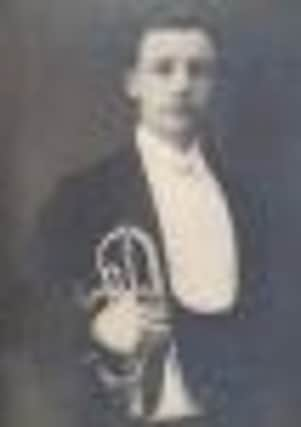EARBY: Legacy lives on of top cornet player (29) killed in First World War


Not only was a young soldier’s life tragically cut short, but the career of the best cornet player in the country halted.
Edwin Firth was a quiet and unassuming man who was shy about his vast talents. But since his death 92 years ago, his legacy has remained in West Craven, not least because of the efforts of his nephew Squire Firth, who is now 75 and lives in Colne Road, Barnoldswick, to collect and preserve the record of his short but celebrated life.
Advertisement
Hide AdAdvertisement
Hide AdAnd now Edwin is to be immortalised internationally after an American professor selected him to be included in an encyclopaedia of “Trumpet Greats”.


Prof. David Hickman, himself one of the pre-eminent trumpet virtuosi of the 20th Century, is compiling the 1,500 page book which identifies the brass greats going back to the 16th century.
From an office in Phoenix, Arizona more than 5,000 miles away, Mr Hickman was keen to find out more about Edwin’s life and see the state of a memorial stone in St Mary’s churchyard in Thornton-in-Craven.
Although Edwin’s body was buried in the Varennes Military Cemetery, his name was added to the gravestone of his sister along with a decorative inscription of a cornet.
Advertisement
Hide AdAdvertisement
Hide AdMr Hickman said: “According to reports, he was the greatest cornetist in England during his time.
“Such people should not be forgotten.”
Born in Earby on December 23rd, 1888, Edwin was the eldest son of 11 children to Squire and Clara Firth.
Both Squire and Edwin’s grandfather Greenwood were accomplished musicians so it was only natural that Edwin should take to playing the cornet so easily at the age of 11. He won his first contest in Bradford in 1904, thus beginning his successful career as a soloist.
His nephew Squire explains: “He became known as ‘The Boy Champion Cornet Player’ and won over 40 gold or silver medals and four silver challenge cups.
Advertisement
Hide AdAdvertisement
Hide Ad“As Edwin’s fame increased it was not uncommon for groups of people to congregate at 8 Victoria Road to listen to him practising.
“But he was a very quiet, nice sort of lad. He was very modest about his achievements and after playing a solo would quickly take his seat only more often than not to be called again to play an encore. He was small in stature and in his youth his father took a box got him to stand on when he played.”
At a time when the popularity of brass bands was at its height and almost every town village had a band, Edwin’s talent was in great demand.
Squire said: “At some of the National Contests crowds of over 40,000 were not uncommon. The top players in these bands were as well known as professional footballers are today.”
Advertisement
Hide AdAdvertisement
Hide AdIn 1908 Edwin was invited to become the solo cornet player for Fodens Motor Works’ brass band, in Cheshire. He signed a contract to receive 10s. 6d. plus expenses for each rehearsal and 15s. for every concert and contest.
The Fodens Band became the best in the country, if not the world, winning championship after championship. In 1913 they were invited to play by Royal Command for King George V and Queen Mary. The King must have been impressed with Edwin’s solo as the band were asked to play again the next day.
Edwin also began to compose his own music for the band and when the magazine British Bandsman ran a competition for a new brass band march, he was the winner with his composition “Westward Ho!”. The march is still played by brass bands to this day, and Edwin’s music was included in last year’s Remembrance Day service at Sough Park.
Edwin married Doris, the granddaughter of Edwin Foden, founder of Fodens Motor Works, in 1916. Soon after, he decided to join the army and was signed up to the 28th London Regiment, also known as The Artists’ Rifles.
Advertisement
Hide AdAdvertisement
Hide AdWhen the Regiment was posted to the Somme, Edwin would play his cornet whenever he could so he would be ready to rejoin the Fodens band.
On June 1st, 1918, Edwin and his colleagues were making their way back to the trenches when a shell exploded, killing nearly all of them. Doris had just 10 weeks earlier given birth to their son, also called Edwin, but the father and son were destined never to meet.
Doris never remarried and stayed in close touch with the family until her death at the age of 98 in 1991. Edwin Junior, known as Teddy, died in 1994 aged 75.
Squire said: “My father Ceres was only 12 when Edwin was killed and he was devastated. Their father never got over it and he died a few years later.
Advertisement
Hide AdAdvertisement
Hide Ad“My father was the only brother to remain unscathed in the war. His brothers Walter and Wright were also severely wounded.
“Sadly, Edwin’s sister Pattie was the post girl at the time and she was the one who delivered the telegram to her parents saying he had died.”
Nearly 100 years later, the Firth family’s musical legacy still lives on. Squire has been playing in brass bands since the end of the Second World War and is looking forward to his uncle’s inclusion in the new book.
He said: “It is great to know that he has been recognised as one of the great cornet players and will always be remembered in this way.”